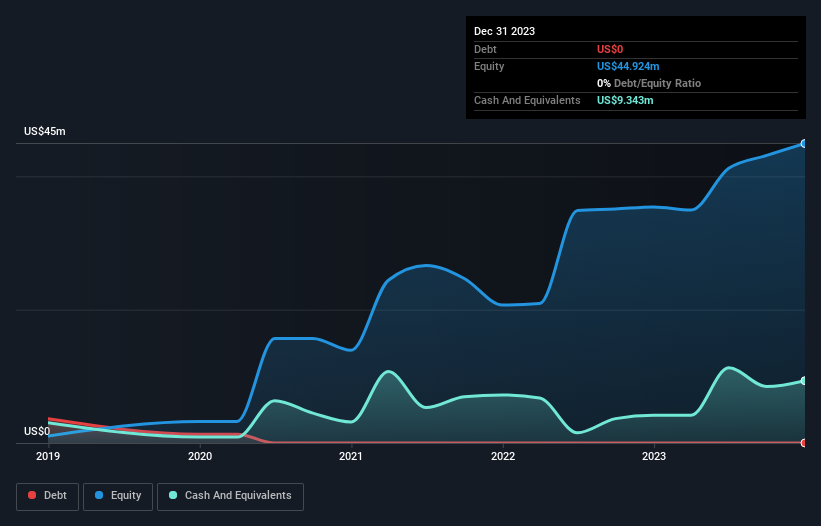We Think Vox Royalty (TSE:VOXR) Can Easily Afford To Drive Business Growth
Even when a business is losing money, it's possible for shareholders to make money if they buy a good business at the right price. For example, although software-as-a-service business Salesforce.com lost money for years while it grew recurring revenue, if you held shares since 2005, you'd have done very well indeed. But the harsh reality is that very many loss making companies burn through all their cash and go bankrupt.
Given this risk, we thought we'd take a look at whether Vox Royalty (TSE:VOXR) shareholders should be worried about its cash burn. For the purposes of this article, cash burn is the annual rate at which an unprofitable company spends cash to fund its growth; its negative free cash flow. First, we'll determine its cash runway by comparing its cash burn with its cash reserves.
View our latest analysis for Vox Royalty
How Long Is Vox Royalty's Cash Runway?
A cash runway is defined as the length of time it would take a company to run out of money if it kept spending at its current rate of cash burn. In December 2023, Vox Royalty had US$9.3m in cash, and was debt-free. Looking at the last year, the company burnt through US$159k. So it had a very long cash runway of many years from December 2023. Notably, however, analysts think that Vox Royalty will break even (at a free cash flow level) before then. In that case, it may never reach the end of its cash runway. The image below shows how its cash balance has been changing over the last few years.
How Well Is Vox Royalty Growing?
Given our focus on Vox Royalty's cash burn, we're delighted to see that it reduced its cash burn by a nifty 94%. This reduction was no doubt supported by its strong revenue growth of 50% in the same period. Overall, we'd say its growth is rather impressive. While the past is always worth studying, it is the future that matters most of all. For that reason, it makes a lot of sense to take a look at our analyst forecasts for the company.
How Hard Would It Be For Vox Royalty To Raise More Cash For Growth?
While Vox Royalty seems to be in a decent position, we reckon it is still worth thinking about how easily it could raise more cash, if that proved desirable. Generally speaking, a listed business can raise new cash through issuing shares or taking on debt. Commonly, a business will sell new shares in itself to raise cash and drive growth. By comparing a company's annual cash burn to its total market capitalisation, we can estimate roughly how many shares it would have to issue in order to run the company for another year (at the same burn rate).
Since it has a market capitalisation of US$104m, Vox Royalty's US$159k in cash burn equates to about 0.2% of its market value. So it could almost certainly just borrow a little to fund another year's growth, or else easily raise the cash by issuing a few shares.
Is Vox Royalty's Cash Burn A Worry?
It may already be apparent to you that we're relatively comfortable with the way Vox Royalty is burning through its cash. For example, we think its cash burn reduction suggests that the company is on a good path. And even its cash burn relative to its market cap was very encouraging. It's clearly very positive to see that analysts are forecasting the company will break even fairly soon. After considering a range of factors in this article, we're pretty relaxed about its cash burn, since the company seems to be in a good position to continue to fund its growth. On another note, we conducted an in-depth investigation of the company, and identified 2 warning signs for Vox Royalty (1 is a bit concerning!) that you should be aware of before investing here.
Of course Vox Royalty may not be the best stock to buy. So you may wish to see this free collection of companies boasting high return on equity, or this list of stocks that insiders are buying.
Have feedback on this article? Concerned about the content? Get in touch with us directly. Alternatively, email editorial-team (at) simplywallst.com.
This article by Simply Wall St is general in nature. We provide commentary based on historical data and analyst forecasts only using an unbiased methodology and our articles are not intended to be financial advice. It does not constitute a recommendation to buy or sell any stock, and does not take account of your objectives, or your financial situation. We aim to bring you long-term focused analysis driven by fundamental data. Note that our analysis may not factor in the latest price-sensitive company announcements or qualitative material. Simply Wall St has no position in any stocks mentioned.

